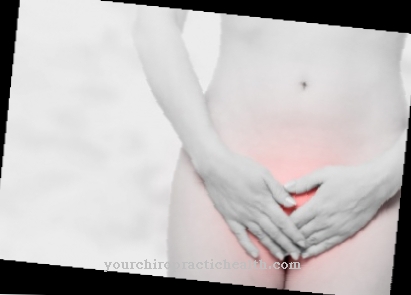Usually kicks Burning tongue not as an independent disease, but as a symptom. Therefore, targeted research into the cause is often necessary.
What is burning tongue?

Burning tongue is assigned to the so-called sensory or sensory disorders in medical terminology. With such sensory disturbances, healthy perception in an affected area is disturbed. Those affected who experience a burning sensation in the tongue often report itching or stinging of the tongue.
The tongue can also feel sore when it burns. Often, parallel to the burning of the tongue, there are also similar sensations on the palate or on the inside of the cheeks.
Other symptoms that often occur in addition to burning tongue are dry mouth or taste disorders: Dry mouth is the subjective feeling that the mucous membrane of the mouth is too dry or that too little saliva is formed.
In medicine, one speaks of a taste disorder when the healthy sense of taste is impaired; For example, flavors are perceived as less intense or alienated.
causes
There are many possible causes underlying your tongue burn. For example, irritation (including from sharp-edged teeth) or inflammation of the mucous membrane of the tongue and mouth can lead to burning sensations. Burning tongue can also develop as an allergic reaction to various substances or foods. Even various fungal infections are considered to be the cause.
However, there can also be more complex causes of a burning tongue, such as various physical illnesses. These diseases include, for example, the so-called sugar disease (diabetes mellitus), anemia (a lack of red blood cells), various infections or deficiency symptoms such as a lack of vitamins or iron.
Burning tongue can also be a side effect that can be observed when taking various medications. Psychological factors are also considered to be an important possible cause: For example, depressive moods or a fear of illnesses can trigger a burning tongue.
You can find your medication here
➔ Medicines against tartar and tooth discolorationDiseases with this symptom
- Food allergy
- Celiac disease
- Diabetes mellitus
- Folic acid deficiency
- Dysphagia
- Iron deficiency anemia
Diagnosis & course
The course of burning tongue usually depends heavily on the underlying cause. If a cause can be clearly diagnosed (for example one of the diseases mentioned, an allergy or substances that irritate the mucous membrane of the tongue), the burning sensation usually disappears or decreases again after treatment.
A prognosis of the course is more difficult if psychosomatic causes are behind the burning sensation in the tongue. If a burning tongue is (rarely) accompanied by visible changes in the mucous membrane, a visit to a doctor is recommended.
The causes of tongue burn can be diagnosed primarily by appropriate specialists such as dentists, neurologists or ear, nose and throat doctors. The clearest possible diagnosis of the causes is an important prerequisite for a targeted treatment of the burning sensation of the tongue.
Complications
A burning sensation in the tongue can have many different causes and symptoms that require different treatment. Those who do not treat their burning tongue have a relatively good chance that the burning sensation will come on by itself. It often occurs after eating foods that the mouth cannot tolerate particularly well, such as pineapple.
However, if you feel a burning tongue for a long time and do not treat it, you can get inflammation in the mouth. This is mostly about inflammation of the gums and the teeth themselves. An ENT doctor or a dentist should then be consulted. Treatment is also necessary if the tongue burning occurs spontaneously without any other changes being noticed.
In the treatment of burning tongue, drugs that have an antibacterial effect are usually used. In a few cases, this can attack the gums and also cause something to burn. The sore throat are also considered normal side effects. If the treatment takes place with antibiotics, general weakness symptoms that resemble a fever are to be expected. This affects the body's immune system.
When should you go to the doctor?
Burning tongue can have many triggers and should therefore be clarified by a doctor. Medical advice is required at the latest when accompanying symptoms such as toothache, inflammation or bad breath occur. Anyone who has a denture or a tongue piercing should speak to the doctor responsible if their tongue burns. There may be irritation or inflammation that needs to be treated immediately to prevent further complications.
If you suspect an allergy or herpes infection, the dermatologist must be called in. The same applies if the tongue turns yellow and smells unpleasant, because then there may be a fungal infection of the oral cavity. Burning tongue during menopause is mostly due to hormonal changes and doesn't necessarily require treatment.
However, serious metabolic diseases such as diabetes, autoimmune or salivary gland diseases, digestive problems, deficiency symptoms or pregnancy can also be the cause. Therefore, a burning tongue should always be examined. This is especially true if the symptoms persist longer than usual or increase in intensity as the disease progresses. Patients who regularly take medication should discuss changes in the oral cavity with their family doctor and, if necessary, switch to another preparation.
Doctors & therapists in your area
Treatment & Therapy
Burning tongue is usually a symptom of an underlying disorder or disease and is not an independent clinical picture, so therapy for burning tongue is usually aimed at combating the respective cause. For example, the treatment plan for a diabetes mellitus disease can be revised or deficiency symptoms can be countered with specific food or dietary supplements.
If the burning sensation of the tongue is a side effect of certain medications, it can make sense to replace the medication with an alternative medication in consultation with the attending physician.
If the burning of the tongue is caused by mental illnesses or complaints, various psychotherapeutic methods can, for example, help to alleviate the psychological problems and thus also to alleviate the burning of the tongue.
If there is no clear cause of a burning sensation in the tongue and a person affected suffers from the burning sensation of the tongue, it is also possible to treat only this symptom at first: for example, the burning of the tongue can then be relieved with various drugs or rinsing solutions. However, medical professionals recommend continuing to pay close attention to possible causes.
Outlook & forecast
A burning sensation on the tongue can have many different causes and therefore does not need to be treated by a doctor in every case. Burning tongue often occurs as a result of an allergic reaction or intolerance. For example, many people suffer from burning tongues after eating a large amount of pineapple. In this case, the burning tongue usually disappears on its own after a few hours and there are no further symptoms. However, if the allergic reaction is severe, it is worth visiting a doctor.
A permanent burning sensation on the tongue can also be due to a lack of certain vitamins or nutrients. In this case it is also advisable to consult a doctor.
If the burning tongue is still left untreated, it can cause discomfort to the gums and teeth. Fever can also occur if there is inflammation. The inflammation is fought with the help of antibiotics. Even with diabetes, the burning sensation on the tongue can occur due to a lack of trace elements. In most cases, however, the symptom can be treated well and does not lead to further complications.
You can find your medication here
➔ Medicines against tartar and tooth discolorationprevention
If the cause of a tongue burn is known and it has been successfully combated, it is easier to prevent a renewed tongue burn than if the cause is unclear: For example, if an allergy has been diagnosed as the cause, it is advisable to avoid contact with appropriate agents or ( if possible and desired) to have a desensitization carried out.
If there are neither organic underlying diseases nor psychological problems, consistent oral hygiene can prevent possible risk factors for burning tongue.
You can do that yourself
Burning tongue can have various causes and must always be clarified by a doctor. In addition, the symptoms can be alleviated with the help of some home remedies and measures. A proven remedy are extracts from medicinal plants.
Teas made from linden blossoms, marshmallow roots or mallow leaves contain irritant-relieving substances that immediately reduce the burning sensation. Aloe vera tinctures or topical oral mucus therapeutics from pharmacies have a similar effect. Basically, good and regular oral care should be ensured. Bacteria in the mouth and especially on the tongue can be removed with the help of a tongue scraper.
The burning sensation may also be triggered by a certain care product. It is therefore advisable to note the occurrence of the symptoms and to eliminate possible triggers. If the mouth feels dry, a diet with sufficient fluids and plenty of water-rich fruit will help. Some fruits and vegetables, such as melon or cucumber, can be frozen beforehand to relieve the burning sensation of the tongue. However, fruits with a high acid content should be avoided as well as alcohol, nicotine and other luxury foods. Effective remedies from homeopathy include the anti-inflammatory Marum verum and the pain reliever tincture of myrrh.













.jpg)

.jpg)
.jpg)











.jpg)